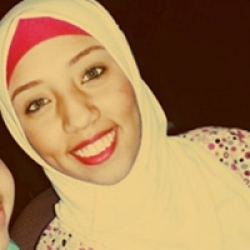
Soad Abu El Hassan Mohamed
Originally from Hurghada on the Red Sea, five hours by car from her university, Soad is the oldest of six siblings, with four brothers and one sister. Her father works two jobs to support the family — as a plumber outside their home governorate and in the governor general’s office in Hurghada — while her mother takes care of the family at home. Soad admires her parents, who have always motivated and supported her educational goals, despite their illiteracy.
Since the eighth grade, recognizing challenges in the public school system and feeling an obligation to the education of her community and country, Soad has spent two to four hours per week teaching children Arabic and English in her home, free of charge. She finds the activity rewarding and plans to continue teaching during vacations when she is home.
In high school, Soad studied in the science track and began to examine possible science fields for university study and a career. Biotechnology in agriculture piqued her interest and through the scholarship, she was able to enroll in the agriculture biotechnology program at Ain Shams University — a program she wouldn’t have been able to afford otherwise. Now having finished her first year, she is in the top five of her class, with a grade point average of 3.9 out of 4.
The scholarship’s enhancement activities have also helped Soad to become more independent and confident, and her example has motivated four young women in the second scholarship cohort to also study agriculture — a field that has great potential in Egypt but which few youth currently enter. Soad dreams of pursuing her postgraduate studies in biotechnology abroad — conducting research, inventing techniques, and creating medicines from plants and animals — ultimately helping to educate other students by becoming a professor of agriculture.


